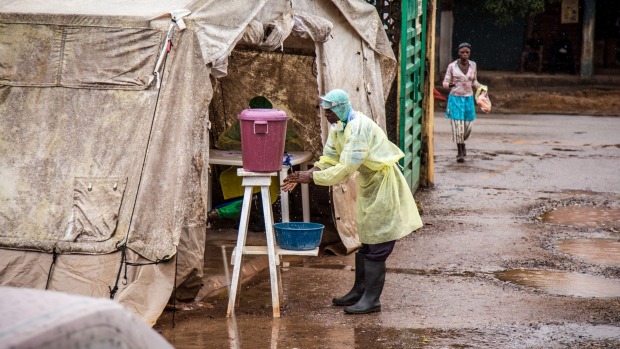
A health worker cleans his hands before entering an Ebola screening tent in Kenema, Sierra Leone. Photo: AP
Washington: Researchers say they are one step closer to developing an Ebola vaccine, with a trial showing promising results.
However, it will be months before any vaccine can be used in the field. Pharmaceutical companies and health agencies are scrambling to fast-track experimental drugs and vaccines that could help.
In the first phase of testing, all 20 healthy adults injected with a higher or lower dose of the vaccine developed antibodies needed to fight Ebola, said the National Institutes of Health, which conducted the study. Results were published on Wednesday in the New England Journal of Medicine.

The grave of an Ebola victim in Freetown, Sierra Leone. Photo: AFP
“The unprecedented scale of the current Ebola outbreak in West Africa has intensified efforts to develop safe and effective vaccines,” said Anthony Fauci, head of the National Institute of Allergy and Infectious Diseases, which is developing the vaccine alongside GlaxoSmithKline.
The vaccines under development “may play a role in bringing this epidemic to an end and undoubtedly will be critically important in preventing future large outbreaks”, he noted.
The institute is “in active discussions with Liberian officials and other partners about next-stage vaccine testing in West Africa” for efficacy and safety, it said, but no announcement on larger-scale trials was expected before early next year.
The volunteers were injected starting in September, and each showed a positive result for Ebola antibodies in blood tests within four weeks.
The 10 volunteers in the higher-dose group developed higher antibody levels, the NIH said.
In Sierra Leone, the government has appealed to the United States to send military aid to help it battle Ebola as it falls behind its West African neighbours Guinea and Liberia in the fight against the virus.
The worst recorded Ebola outbreak has killed at least 5689 people out of out of 15,935 cases, the World Health Organisation said on Wednesday, as the virus has overwhelmed African countries with weak infrastructure and healthcare systems.
While the outbreak appears to be coming under control in Liberia, thanks partly to a health operation run by US troops, infection rates have accelerated in Sierra Leone.
The rate of transmission is also beginning to slow in neighbouring Guinea, the first country to report an Ebola case, although case numbers are rising in Mali.
“I believe now that the cases are reducing in Liberia, he [US President Barack Obama] will ask the Department of Defence and the State Department also to turn attention to helping the efforts in Sierra Leone,” said Alpha Kanu, Sierra Leone’s minister of information and communication.
He also appealed to the United States to help Guinea, and urged Britain to provide more assistance to Sierra Leone.
Sierra Leone’s President Ernest Bai Koroma has introduced emergency Ebola measures. He said it might be necessary to call another three-day lockdown to remove the sick from communities and transfer them to newly built treatment centres.
“Liberia and Sierra Leone report that fewer than 70 per cent of patients are isolated, though there is wide variation among districts,” the World Health Organisation said, referring to an international target set for December 1. However, some data is out of date, it said.
Isolation is required to halt further spread of the viral hemorrhagic disease, and the aim is to isolate 100 per cent of patients by January 1, it added.
Meanwhile, the European Commission called on Wednesday for 5000 doctors to be sent from European Union states to combat west Africa’s Ebola epidemic, a European source said on Wednesday.
“The situation is too serious and it needs an immediate response,” the source said, adding that senior EU officials were in contact with national governments to mobilise the response. “Thousands of other medical caregivers were also being called for,” the source said.
AFP, Reuters
